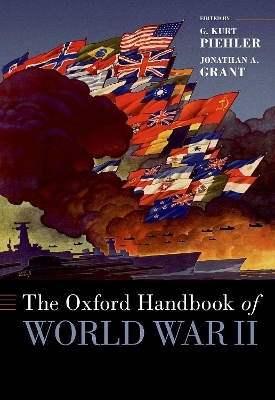
The Oxford Handbook of World War II
Oxford University Press Inc (Verlag)
978-0-19-934179-5 (ISBN)
Organized both chronologically and thematically and with particular attention to the pre- and post-war eras, the Handbook revises and extends existing scholarship. With chapters on the rise and fall of Nazi Germany, the land war in Western Europe, the Battle of Britain, the impact of war on the major combatants (Great Britain, France, the United States, Japan, and China), the Japanese attack on Pearl Harbor, the decision to use the atomic bomb in 1945, and the cultural responses to the war, the chapters span much of the twentieth century. They suggest areas of scholarly consensus, identify interpretative clashes, and propose agendas for further scholarly investigation, with an emphasis on interdisciplinary inquiry. For example, the end of the Cold War had a profound impact on the way World War II was understood. Many formerly closed records in the former Soviet Union and China were opened to scholars, facilitating a more complex view of the Soviet war effort and suggesting that Stalin's army did not simply triumph by overwhelming German forces with sheer numbers but mastered the demands of a vast and logistically demanding front.
In conceptualizing the volume, editors Kurt Piehler and Jonathan Grant also sought out contributions on lesser known aspects of the war, such as the Bengal famine in India, the treatment of prisoners of war, the role of Middle Eastern nations, and the activities of non-governmental organizations in ameliorating suffering. Spanning the rise and fall of the Versailles system to the postwar reintegration of veterans and the eventual commemoration of the conflict and its victims, The Oxford Handbook of World War II marks a landmark contribution to the historical literature of war.
G. Kurt Piehler is Director of the Institute on World War II and the Human Experience of World War II and Associate Professor of History at Florida State University. His research centers on war and society with a focus on World War II. As founding director of the Rutgers Oral History Archives (1994-1998) he has interviewed more than 200 veterans of World War II. He is the author of Remembering War the American Way, and A Religious History of the American GI in World War II, and consulting editor for The Oxford Companion to American Military History. Jonathan A. Grant is Professor of Modern Russian History at Florida State University in Tallahassee. His most recent book, Between Depression and Disarmament, examines the armaments business in Eastern Europe 1919-1939.
Contributors
Introduction
G. Kurt Piehler and Jonathan Grant
Chapter 1: The Collapse of the Versailles System - Michael Creswell
Chapter 2: Ideological Origins of World War II - Vladimir Tismaneanu and Bogdan C. Iacob
Chapter 3: The Spanish Civil War - Peter Garretson and S. P. McVeigh
Chapter 4: The Sino-Japanese War - Gao Bei
Chapter 5: Forging Alliances: The Axis - Ricky W. Law
Chapter 6: German Victories, 1939-1940 - Eugenia C. Kiesling
Chapter 7: The Battle of Britain: Britain and the British Empire Alone - Andrew Stewart
Chapter 8: The Battle of the Atlantic - Marc Milner
Chapter 9: The Axis of the Soviet Union, 1941-1943 - Jonathan Grant
Chapter 10: The Middle East during World War II- Hakan Güngör and Peter Garretso
Chapter 11: Pearl Harbor and Japan Ascendant - Sidney Pash
Chapter 12: The United Nations and the Grand Alliance - David B. Woolner
Chapter 13: The Air War: Germany and Italy - M. Houston Johnson
Chapter 14: North Africa and Italy - Douglas Porch
Chapter 15: Eastern Europe in World War II - Deborah Cornelius and Jonathan A. Grant
Chapter 16: The Eastern Front, 1943-1945 - David Stone
Chapter 17: From D-Day to the Elbe - Peter Mansoor
Chapter 18: The Land War in Asia: China, Burma, and India - Alan Jeffreys
Chapter 19: The Pacific War - Kyle P. Bracken
Chapter 20: The Air War and Conflict Termination in the Pacific - Conrad C. Crane
Chapter 21: Home Fronts at War - Judy Barrett Litoff
Chapter 22: Neutral Powers in a Global War - Neville Wylie
Chapter 23: Western Religious Leaders, Communities, and Organizations before and during the Second World War - Victoria J. Barnett
Chapter 24: Science and Technology - Ronald E. Doel and Kristine C. Harper
Chapter 25: The Environmental Impact - Charles Closmann
Chapter 26: Medicine and Disability - John Kinder
Chapter 27: The Holocaust - Jan Ruth Mills
Chapter 28: The Humanitarian Response - Hillary Sebeny
Chapter 29: Rendering Justice - Michael Bryant and James Sedgwick
Chapter 30: Cultural Responses to Total War - Annika Culver
Chapter 31: Postwar Settlements and Internationalism - Regina Gramer and Yutaka Sasaki
Chapter 32: Reintegrating Veterans and Demobilizing Populations - R. M. Douglas
Chapter 33: The Memory and Commemoration of War - Brian M. Puaca and Shizue Osa
| Erscheinungsdatum | 10.06.2023 |
|---|---|
| Reihe/Serie | OXFORD HANDBOOKS SERIES |
| Zusatzinfo | 8 maps |
| Verlagsort | New York |
| Sprache | englisch |
| Maße | 249 x 181 mm |
| Gewicht | 1397 g |
| Themenwelt | Geschichte ► Allgemeine Geschichte ► Neuzeit (bis 1918) |
| Geschichte ► Allgemeine Geschichte ► 1918 bis 1945 | |
| Geschichte ► Teilgebiete der Geschichte ► Militärgeschichte | |
| Sozialwissenschaften ► Politik / Verwaltung | |
| ISBN-10 | 0-19-934179-6 / 0199341796 |
| ISBN-13 | 978-0-19-934179-5 / 9780199341795 |
| Zustand | Neuware |
| Haben Sie eine Frage zum Produkt? |
aus dem Bereich


